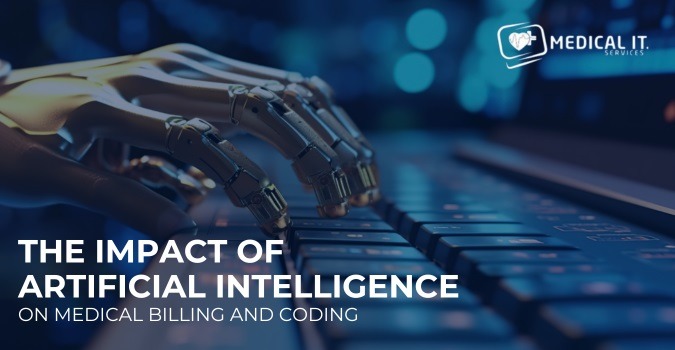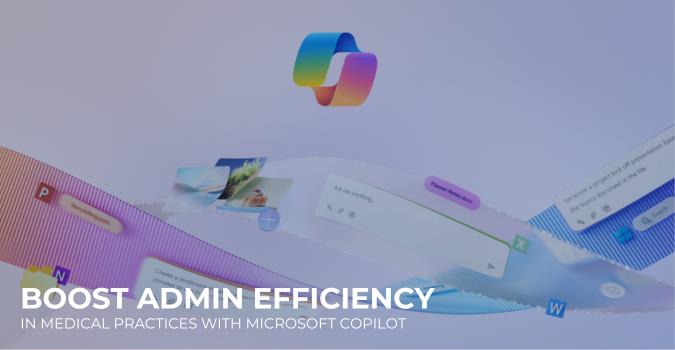While most clinics are busy managing patient flow, compliance, and billing, there’s a silent threat…

The Impact of Artificial Intelligence on Medical Billing and Coding
The advent of Artificial Intelligence (AI) has ushered in a new era of efficiency and accuracy in various industries, with healthcare being no exception. Among the many facets of healthcare, medical billing and coding stand out as areas ripe for AI-driven transformation. In this article, we will explore the impact of Artificial Intelligence on medical billing and coding, highlighting its benefits and potential challenges.
The Challenges of Traditional Medical Billing and Coding:
Traditional medical billing and coding face numerous challenges in today’s healthcare environment. Here are the most unique challenges:
- Manual Processes: Medical billing and coding rely heavily on manual data entry and interpretation of medical records, leading to inefficiencies and human error.
- Coding Accuracy: Inaccurate coding can result in denied claims, delayed reimbursements, and revenue loss for healthcare providers.
- Repetitive Tasks: Medical coders often spend a significant amount of time on repetitive tasks, which can lead to burnout and decreased productivity.
The Promise of AI in Medical Billing and Coding:
Artificial Intelligence (AI) offers a range of capabilities that can significantly improve the efficiency and accuracy of medical billing and coding:
Enhanced Accuracy and Efficiency:
AI-powered algorithms possess the ability to analyze vast amounts of medical data with unprecedented speed and accuracy. In medical billing and coding, this translates to the automation of repetitive tasks such as coding diagnoses and procedures, ensuring adherence to complex regulatory standards such as ICD-10 and CPT codes. By automating these processes, AI minimizes the likelihood of human error, leading to fewer claim denials and faster reimbursement cycles.
Real-time Insights and Predictive Analytics:
One of the most significant advantages of AI in medical billing and coding is its capacity to provide real-time insights and predictive analytics. By analysing historical billing data and identifying patterns, AI algorithms can predict potential coding errors or discrepancies before claims are submitted, enabling healthcare organisations to proactively address issues and mitigate risks. Furthermore, AI-driven predictive analytics can optimize revenue cycle management by identifying opportunities for revenue enhancement and cost reduction.
Improved Compliance and Regulatory Adherence:
Compliance with healthcare regulations and billing standards is paramount to avoid penalties and legal repercussions. AI solutions can assist healthcare organisations in ensuring adherence to regulatory requirements by continuously monitoring and updating coding practices based on the latest industry guidelines. Moreover, AI algorithms can identify potential compliance issues, such as upcoding or undercoding, and provide recommendations for corrective actions, thereby reducing the risk of audits and penalties.
Enhanced Patient Experience:
While the primary focus of medical billing and coding is on financial reimbursement, the impact of these processes extends to the overall patient experience. By leveraging AI-driven technologies to streamline billing procedures, healthcare providers can reduce administrative burdens and paperwork, allowing staff to dedicate more time to patient care. Additionally, faster claim processing and accurate billing statements contribute to greater transparency and trust between patients and healthcare providers, ultimately improving patient satisfaction.
Revenue Cycle Management:
AI’s role extends beyond coding to encompass the entire revenue cycle. By analyzing patterns and predicting potential issues, AI systems can streamline billing workflows, identify bottlenecks, and suggest optimisations, thus ensuring that healthcare providers maintain a healthy cash flow.
Fraud Detection:
Healthcare fraud is a significant concern, costing billions annually. AI’s data analysis capabilities are invaluable in detecting anomalies and patterns indicative of fraudulent activities, thereby safeguarding the financial interests of healthcare institutions.
Data Security:
With patient data being highly sensitive, AI also plays a pivotal role in ensuring its security. Through continuous monitoring and anomaly detection, AI systems can preemptively identify and address potential data breaches.
Conclusion: A Collaborative Future
The impact of AI on medical billing and coding is undeniable. However, it’s important to view AI as a tool to empower human coders, not replace them. AI can handle repetitive tasks, allowing human coders to focus on their expertise and apply critical thinking to complex cases.
Optimise Your Medical Billing and Coding Processes
As AI technology continues to evolve, MedicalIT.Services staying at the forefront of these advancements. We offer comprehensive solutions and expert guidance to help healthcare providers leverage AI effectively and optimize their billing and coding processes. Contact us today to learn how we can help your organisation unlock the full potential of AI and achieve a more efficient and profitable RCM system.
Also Read:



